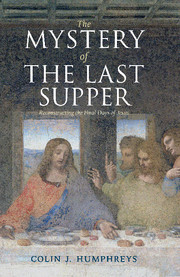Book contents
- Frontmatter
- Contents
- List of illustrations
- Foreword by I. Howard Marshall
- Acknowledgements
- 1 Four mysteries of the last week of Jesus
- 2 Dating the crucifixion – the first clues
- 3 The problem of the last supper
- 4 Can we reconstruct the Jewish calendar at the time of Christ?
- 5 The date of the crucifixion
- 6 The moon will be turned to blood
- 7 Did Jesus use the solar calendar of Qumran for his last supper Passover?
- 8 Does ancient Egypt hold a key to unlocking the problem of the last supper?
- 9 Discovering the lost calendar of ancient Israel
- 10 Was the lost ancient Jewish calendar used in Israel at the time of Jesus?
- 11 The date of the last supper: the hidden clues in the gospels
- 12 From the last supper to the crucifixion: a new analysis of the gospel accounts
- 13 A new reconstruction of the final days of Jesus
- Notes
- Bibliography
- Index of biblical and other ancient sources
- General index
13 - A new reconstruction of the final days of Jesus
Published online by Cambridge University Press: 03 May 2011
- Frontmatter
- Contents
- List of illustrations
- Foreword by I. Howard Marshall
- Acknowledgements
- 1 Four mysteries of the last week of Jesus
- 2 Dating the crucifixion – the first clues
- 3 The problem of the last supper
- 4 Can we reconstruct the Jewish calendar at the time of Christ?
- 5 The date of the crucifixion
- 6 The moon will be turned to blood
- 7 Did Jesus use the solar calendar of Qumran for his last supper Passover?
- 8 Does ancient Egypt hold a key to unlocking the problem of the last supper?
- 9 Discovering the lost calendar of ancient Israel
- 10 Was the lost ancient Jewish calendar used in Israel at the time of Jesus?
- 11 The date of the last supper: the hidden clues in the gospels
- 12 From the last supper to the crucifixion: a new analysis of the gospel accounts
- 13 A new reconstruction of the final days of Jesus
- Notes
- Bibliography
- Index of biblical and other ancient sources
- General index
Summary
Therefore, since I myself have carefully investigated everything from the beginning, it seemed good also to me to write an orderly account for you, most excellent Theophilus, so that you may know the certainty of the things you have been taught.
(Luke 1:3–4)Scholars who have looked at what we can know about the historical Jesus from the Gospels have generally decided that the answer is ‘not much’.
(Judith Redman)The quotations above strikingly illustrate the difference between the claims of a gospel, in this case that of Luke, to have carefully investigated everything about the life of Jesus and the claims of many modern scholars, that we cannot reliably understand much about the historical Jesus from the gospels. Geza Vermes represents what is often thought to be the view of the majority of scholars about the gospels when he writes: ‘They are filled with discrepancies.’
In this book I have carefully investigated the last days of Jesus afresh. I have forensically examined the gospels, comparing them with each other and with historical sources. I have found that the major apparent discrepancies in the gospel descriptions of the final days of Jesus, including the last supper, do not exist. They arise because we have wrongly interpreted the gospel texts. When correctly understood, all four gospels agree with each other to a remarkable extent. They also agree with the relevant passages in the Dead Sea Scrolls and with Jewish and Roman historians.
- Type
- Chapter
- Information
- The Mystery of the Last SupperReconstructing the Final Days of Jesus, pp. 191 - 196Publisher: Cambridge University PressPrint publication year: 2011



